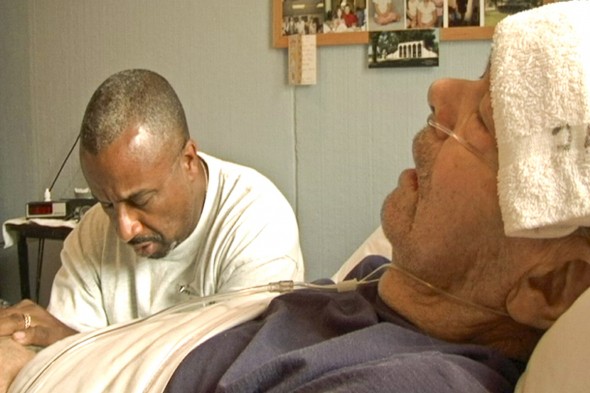Oscar-nominated film by UIC staffer comes full circle

“Prison Terminal: The Last Days of Private Jack Hall,” tells the final days of a dying inmate and the inmates who care for him as hospice volunteers. — Photo courtesy of HBO
Edgar Barens doesn’t like to make people cry, but his Oscar-nominated documentary does just that.
Barens’ film, “Prison Terminal: The Last Days of Private Jack Hall,” will be presented for the first time on campus Nov. 13. The free screening and discussion afterwards are sponsored by the Jane Addams College of Social Work, where Barens is a media specialist.
The 40-minute documentary tells the final days of a dying inmate serving a life sentence for murder in the Iowa State Penitentiary, and the inmates who care for him as volunteers in the prison’s hospice program.
In other words, it’s a tearjerker.
Since his documentary aired on HBO last spring, Barens has shown “Prison Terminal” to audiences in many prisons.
He recalls the inmates’ reactions when the film was screened in an Ohio women’s correctional facility. “Rolls of toilet paper were being passed from hand-to-hand,” said Barens. “They saw themselves on the screen.” When the lights came up, the warden told the women the facility would set up its own hospice, even better than the one in the film.
Barens plans to show his film in West Coast prisons next spring. “I’m hoping that trip will accomplish what happened in Ohio,” he said. But his biggest goal: working to change prison policy by showing his documentary to legislators in Washington, D.C.
“The hospice volunteers provide comfort care, cleaning, compassion, and talk to these guys in their last minute,” he said. “Good can happen behind bars.”

“My point was to humanize the prison population,” says Edgar Barens, media specialist in social work.
Most of the 1,800 prisons in the U.S. have infirmary cellblocks, but only 70 have hospice care, with 20 offering a volunteer program for inmates, Barens said. “My point was to humanize the prison population,” he said.
Barens’ next documentary will portray the harsh working conditions of long-haul truck drivers. “This industry has changed since the ’70s, when they were unionized. Now they’re ill, unhealthy, about 70 percent of them are obese,” he said. “They deliver everything we’re using, and we’re not treating them well.”
Barens said he is honored and gratified to show “Prison Terminal” to the UIC community.
Creasie Finney Hairston, professor and dean of social work and director of the social policy center, was instrumental in helping him finish the film, he said.
“To be able to show it at UIC, it’s come full circle,” Barens said. “And if we can start a dialogue between colleagues, that would be great.”
Ultimately, Barens wants his film to be a force for change. “That’s why I made it.”
The screening and discussion, free and open to the public, will be held 4:30 to 6 p.m. in the L285 Auditorium, Education, Theatre, Music and Social Work Building, 1040 W. Harrison St. RSVP to byrons@uic.edu
